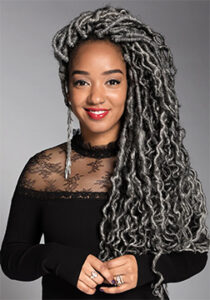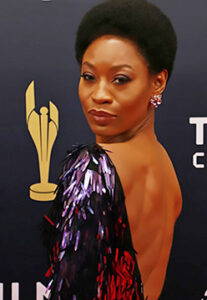
One of the most iconic scenes from the 2000 classic Bring It On is when the cheerleading team led by Torrance Shipman — played by a peppy Kirsten Dunst — gets called out for stealing routines from a Black squad.
Fast-forward to 2022 and a new web satire is rethinking that very scene — putting the three white cheerleaders who stole the cheer in front of a judge and serving them with “four counts of serial dance colonization.”
Revenge of the Black Best Friend, co-written and co-produced by CBC host, screenwriter and playwright Amanda Parris, tackles those kinds of stereotypes, tropes, and tokenization thrust on Black actors, showing that revenge is best served as satire.
The CBC Gem original series stars Oluniké Adeliyi (The Porter) as self-help guru Dr. Toni Shakur, someone on a mission to help Black actors rise to be more than just the sassy friend, the sidekick or the first person to die in a horror movie.
It’s Parris’s first comedy production, and she said using humour to tackle these topics was a deliberate choice.
“For me it’s very easy to think about this topic and go to an intellectual space and to write the essay and to analyze and deconstruct it,” she said. “But I just felt like if we dealt with this in a comedy, it would widen [it and] maybe invite more people into the conversation.”

Much of the show holds a mirror up to the film industry, suggesting those at the top take a good look at how they’re involved in perpetuating negative stereotypes on screen.
In one episode, Dr. Shakur is asked to be a guest judge on Thug Race, where three Black actors and one white actor compete to see who sounds the most “thug” to secure a speaking role in an upcoming film.
The catalyst for the series is a mix of Parris’s own experience in theatre and a stint spent re-watching shows and movies from the ’90s and early 2000s like Bring It On and Buffy the Vampire Slayer. She began rethinking about how she remembered the Black characters being represented compared to how they were actually portrayed.
In her series, Parris demonstrates sharp comedic skills while exposing the industry’s limited thinking.
“I think keeping our focus specifically on the stereotypes and tropes of the film and television industry was critical,” said Parris.
The success of Black-led productions in the U.S. proves there is an appetite for Black storytelling.
The Jeffersons, which first aired in 1975, was one of the longest-running sitcoms with a primarily Black cast, while the ’90s introduced audiences to Family Matters, The Fresh Prince of Bel-Air and in 2000, Girlfriends.
ABC’s primetime hit Black-ish, which recently ended after eight seasons, created two spinoffs, Grown-ish and Mixed-ish, and was sold for syndication after four seasons.
“There’s a lot of room for progress in so many different artistic arenas in Canada,” Parris added.
The Porter, which is streaming on CBC Gem, is one of the only Canadian-network productions that features a primarily Black cast and crew.
Parris hopes Revenge of the Black Best Friend will spark this country’s film and television industry to diversify.
“Obviously there’s a conversation I hope industry gatekeepers will hopefully be instigated to have after watching,” Parris said.
While these conversations are an important takeaway, equally as important to Parris is for Black actors to be affirmed and feel seen — and to have their experiences validated and shared with a wider audience.
“I think that was a core part of it. I just want them to watch and be like, ‘Yeah, exactly!’ You know, and to just see themselves and feel like somebody has seen them.”


